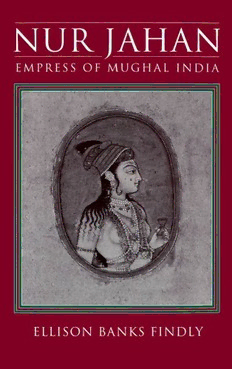
Nur Jahan, empress of Mughal India PDF
Preview Nur Jahan, empress of Mughal India
Nur Jahan This page intentionally left blank Nur Jahan Empress of Mughal India Ellison Banks Findly New York Oxford OXFORD UNIVERSITY PRESS 1993 Oxford University Press Oxford New York Toronto Delhi Bombay Calcutta Madras Karachi Kuala Lumpur Singapore Hong Kong Tokyo Nairobi Dar cs Salaam Cape Town Melbourne Auckland Madrid and associated companies in Berlin Ibadan Copyright © 1993 by Oxford University Press, Inc. Published by Oxford University Press, Inc., 200 Madison Avenue, New York, New York 10016 Oxford is a registered trademark of Oxford University Press All rights reserved. No part of this publication may be reproduced, stored in a retrieval system, or transmitted, in any form or by any means, electronic, mechanical, photocopying, recording, or otherwise, without the prior permission of Oxford University Press. Library of Congress Cataloging-in-Publication Data Findly, Ellison Banks. Nur Jahan, empress of Mughal India / Ellison Banks Findly. p. em. Includes bibliographical references and index. ISBN 0-19-507488-2 1. Nur Jahan, Empress, consori of Jahangir, Emperor of Hindustan. d. 1645. 2. Mogul Empire—Empresses—Biography. I. Title. DS461.9.N8F56 1993 954.02'5'092—dc20 [B] 92-8697 246897531 Printed in the United States of America on acid-free paper for Caroline and Ross This page intentionally left blank Preface After much consideration, I have decided to remove diacriticals from the text. Two issues weighed heavily on this decision: first, there is a substantial amount of quoted material with varying transliteration conventions that proved to be distracting to read (the variant English forms already add a certain fragmenta- tion); and second, since most current histories do not use all diacriticals, espe- cially in the case of Persian, Urdu, and Sanskritic words, the decision which to include and which not was somewhat arbitrary. Since this is not meant as a specialized textual study but rather a documentation of the early emergence of the Nur Jahan legend, omitting diacriticals seemed the best and most consistent course. In stabilizing transliteration conventions, I have for the most part followed the Cambridge History of India (minus the diacriticals), leaving bibliographic references as they are published when they are not a part of the regular narrative. In passages quoted directly from a text, the spelling and grammar of the original have been preserved, and geographic and place names, where possible, follow currently preferred spellings. For the ease of the reader, finally, some names have been run together (without hyphens) and others left to stand as separate words (for example, Itimaduddaula and Nur Jahan). Verb tenses, generally, are as follows: information from primary sources is in the past tense, that from secondary sources is in the present tense. Such differen- tiation highlights the many layers of an unfolding tradition. Hartford, Conn. E. B. F. April 1992 This page intentionally left blank Acknowledgments To all those who have had some small hand in this work, I extend my thanks, and especially to Trinity College for an exploratory grant from its 1980's Fund from the Andrew W. Mellon Foundation in the spring of 1985, and to the National Endowment for the Humanities for an NEH Fellowship for College Teachers in 1987-88; to Robert Skelton, Betty Tyres, David James, Milo Beach, and Jim Wescoat for their helpful expertise in the Indian arts; to M. C. Joshi, Ali Sardar Jafri, K. A. Abbas, Pran Chopra, Balwant Gargi, Kumkum Singh, and A. N. Khanna for their time, their efforts, and their great wisdom in things Mughal; and to Bilkiz Alladin, Galib and Noshina Bachooali, Ashok and Renu Bhandari, and Gian and Lalita Sachdev for their kind hospital- ity and continuing generosity in the details of finding things; to Wheeler Thackston and Syed N. Haq for translating selected passages; to Pat Bunker, Linda McKinney, and Peter Knapp of the Trinity College Library's reference department for tireless efforts on my behalf; to Gay Weidlich, mid-wife to this project, whose expert eye, deft hand, and gracious industry have lightened the task immeasurably; to Craig, whose patience, commitment, and sense of humor have never flagged; and, finally, to Caroline and Ross, in whose laughter, energy, and affection this work has flourished.
